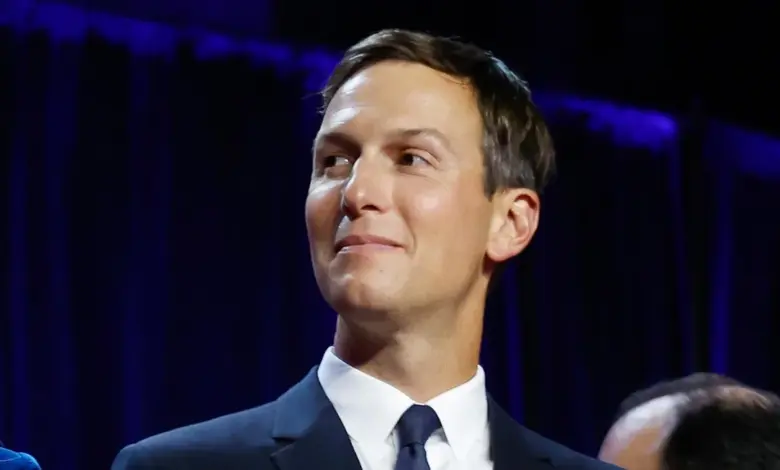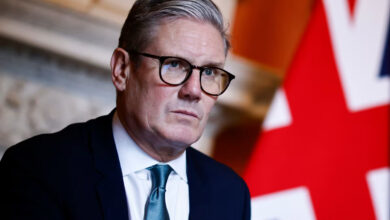
President-elect Donald Trump’s son-in-law Jared Kushner is seen as being pivotal to the incoming administration’s Middle East efforts, even though he is not likely to take a formal job within it, regional diplomats and Trump allies told CNN.
Trump’s Middle East team has been taking shape this week after he selected a former Republican governor and a close friend and real-estate developer to take on key roles. But the close relationships that Kushner developed with leaders in the region over Trump’s first four years in office and maintained in recent years will be hard to replicate, sources told CNN.
Some former diplomats and critics of the Trump administration point out that Kushner has significant financial interests in the region, but many regional diplomats recognize the value of the deep relationships he has formed.
“No one on the incoming team has what Jared has, and that is trust. Jared earned it, he didn’t have it at the beginning. He earned it. That takes time to build,” said a regional diplomat who worked with Kushner during his time at the White House, noting that Kushner was relatively unknown to most players in the region before he became chief Middle East negotiator in the first Trump administration.
Those sentiments are widespread.
“Friendships are forever in this region,” said an Israeli source who dealt with the first Trump administration, speaking to the deep personal relationships that Kushner developed – and maintained – with leaders throughout the region. “My assumption is that his role is much more in his hands than anybody else’s.”
Kushner is not likely to assume a formal role in Trump’s second administration, but he is likely to serve as an outside advisor, said two sources familiar with his current thinking.
Kushner is currently fully available to brief and advise all of those who will be working on issues related to the Middle East, said a source familiar with the situation, adding that he believes further progress is possible under Trump’s leadership.
Both Kushner and Trump would like to see a continuation of efforts to normalize relations between Israel and other Arab states following the Abraham Accords, a pact which normalized relations between Isreal and the United Arab Emirates during Trump’s first term – an effort made much more complicated given the ongoing wars in Gaza and Lebanon.
Since Trump left office in 2021, Kushner and his wife, Ivanka Trump, have moved to Miami and largely exited politics. Kushner founded an investment fund, Affinity Partners, shortly after leaving Washington with major backing from sovereign wealth funds in the Gulf.
Kushner has also maintained relationships with key players in the Middle East, including Israeli officials and leaders in the Arab Gulf. In particular, he has remained in contact with Saudi Crown Prince Mohammed bin Salman, the kingdom’s de facto leader.
Kushner is close to Saudi crown prince
During Trump’s first term, Kushner became close enough with bin Salman that the men communicated over text — to the occasional frustration of career national security officials, who were kept in the dark about the substance of the conversations.
On Trump’s first trip abroad to Saudi Arabia in 2017, Kushner and Ivanka Trump were feted alongside the president at a series of ceremonies and events. Later, Kushner would travel on separate visits to the kingdom for discussions with MBS that stretched late into the night.
But Kushner’s potential involvement this time comes with a new complicating layer: in recent years his fund received $2 billion in funding from Saudi Arabia’s Public Investment Fund. That economic relationship will heighten scrutiny on Kushner’s involvement.
Some US diplomats are already concerned about Trump possibly pursuing a path prioritizing his family’s financial interests over the national interest.
“Prioritizing Saudi Arabia’s prosperity because it could help the Trump family is a major concern for US diplomats,” said a current US diplomat, who remembers the secrecy surrounding Kushner’s engagements during the first term which in and of themselves created confusion.
Yet deploying Kushner might be seen as necessary out of the gates if Trump is to move as quickly as he has promised to end the wars in the region. Earlier this year, Trump said that Israel had to “finish what they started” in Gaza and “get it over with fast.”
Kushner himself has not spoken extensively on the situation in the Middle East recently, but comments he made during an interview at Harvard at this year did generate headlines.
“Gaza’s waterfront property could be very valuable … if people would focus on building up livelihoods,” Kushner said in March.
“It’s a little bit of an unfortunate situation there, but from Israel’s perspective I would do my best to move the people out and then clean it up,” Kushner said. “But I don’t think that Israel has stated that they don’t want the people to move back there afterwards.”
The comments sparked outrage from many in the region, especially given the immense toll that the war has taken on the Palestinian people.
“What we are seeing is an active and bloody conflict, with all that people in the Arab world see is babies being killed. Those comments were disturbing because Kusher was coming at this with very cold and materialistic language which is very jarring for a people craving empathy. It was very, very tone deaf,” said Ghaith Al-Omari, a senior fellow at the Washington Institute who added he expects Kushner to steer clear of that kind of language going forward, particularly because it could enflame relations with other Arab nations like Saudi Arabia.
Trump spoke last week with bin Salman following his election victory. It was his second call to the region following his conversation with Israel Prime Minister Benjamin Netanyahu, an indication that he will prioritize the US-Saudi relationship.
Kushner is also close to Israeli officials, including Netanyahu, who he has known since he was young. An anecdote emerged during Trump’s first presidency that when he was a teenager, Kushner gave up his bedroom for a night so Netanyahu would have a place to sleep while visiting the Kushners’ home in New Jersey. Kushner’s recent meeting with Netanyahu’s minister of strategic affairs, Ron Dermer, was an indication of just how close Kushner has remained to Israeli officials.
Conflicts raging
How efforts to normalize relations between Isreal and Saudi Arabia proceed while the war in Gaza is raging and while the Israel-Hezbollah conflict continues to deepen is an open question, yet key Trump allies are confident Kushner’s framework still works.
“If you look at the plan that Jared put forward during the first term, that has all of the elements” leaders in the region are seeking, said Brian Hook, a top State Department official in Trump’s first term.
“I’m confident that that sort of thinking and working with the Palestinians and the Israelis, as much as circumstances will allow, are going to do a lot,” Hook, who is leading Trump’s State Department transition efforts, said last week on CNN International.
A lot of Trump’s nominees have read, or are reading, Kushner’s book published in 2022 to understand the players and dynamics in the region, explained the source familiar with the situation.
While some in Kushner’s orbit question how much he will be relied on, there is agreement across the board – among regional diplomats, US diplomats who worked on the region, people in Trump’s orbit, and former Trump administration officials – that Kushner will have a hand in the administration’s forthcoming approach to the Middle East whether or not he is serving in the administration.
“Having a texting relationship with MBS proved productive during the first term,” said a former Trump administration official. “It is hard to see how that channel is not used going forward.”
There is an expectation that Kushner’s relationships could be pivotal for discreet engagements to drive forth Trump’s objectives in ending the conflicts and propelling US-Saudi normalization.
“I can see a world where Trump says can you go meet with so and so,” said the first diplomat, specifically referencing possible engagements with Kushner and bin Salman. “Kushner could be sent on missions or assignments.”
Both Former Arkansas Gov. Mike Huckabee, who Trump picked as the next ambassador to Israel, and Steve Witkoff, who will lead the overall regional efforts, come to the job with relationships of their own. Yet how they work together – and with Kushner – remains an open question.
“Does Witkoff have an ego? That is the key question,” explained Aaron David Miller, a former Middle East negotiator at the State Department, referring to Trump’s longtime friend and real estate developer who will serve as his special envoy to the Middle East. “If he wants to succeed and does not establish working relationship with Kushner and Rubio (Trump’s secretary of state pick) he is making a gigantic mistake.”
Witkoff has already reached out to countries in the region about arranging a visit, explained multiple sources, saying that the timing for those meetings is still being figured out. And in recent weeks before Trump announced Witkoff for the job, he had an important meeting to review the portfolio and its players: with Kushner.




